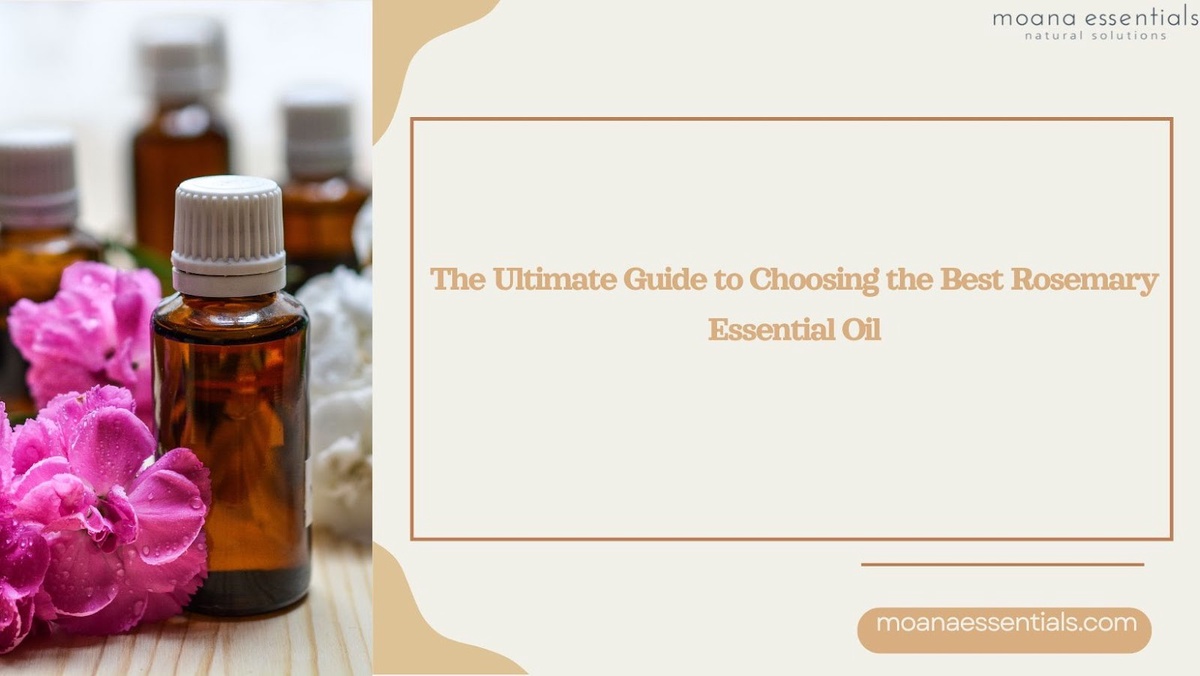Introduction:
Rosemary essential oil is a versatile and popular choice in aromatherapy and natural wellness practices. Known for its refreshing aroma and potential health benefits, finding the right rosemary essential oil can enhance your well-being and elevate your self-care routine. However, with so many options available, choosing the best rosemary essential oil can be overwhelming. In this comprehensive guide, we’ll explore everything you need to know to make an informed decision.
- Understanding Rosemary Essential Oil:
- Origin and History: Rosemary (Rosmarinus officinalis) is an evergreen shrub native to the Mediterranean region. Its use dates back to ancient civilizations, where it was prized for its medicinal properties.
- Extraction Process: Rosemary essential oil is typically extracted through steam distillation of the plant's leaves and flowers, resulting in a concentrated liquid with the herb's distinct aroma and beneficial compounds.
- Aroma and Benefits: The aroma of rosemary essential oil is herbaceous, woody, and slightly camphoraceous. It is valued for its potential to promote mental clarity, improve memory, alleviate stress, and support respiratory health.
- Factors to Consider When Choosing Rosemary Essential Oil:
- Purity: Look for 100% pure rosemary essential oil without any additives or synthetic ingredients. Opting for organic or wildcrafted varieties can ensure the highest quality.
- Source and Sustainability: Consider the sourcing practices of the brand. Sustainable harvesting methods and ethical sourcing contribute to environmental conservation and support local communities.
- Extraction Method: Steam distillation is the preferred method for extracting rosemary essential oil, as it preserves the oil's integrity and therapeutic properties.
- Quality Standards: Check if the oil meets industry standards and certifications for purity and quality, such as GC/MS testing results from third-party laboratories.
- Different Varieties of Rosemary Essential Oil:
- Chemotypes: Rosemary essential oil comes in different chemotypes, each with unique chemical compositions and therapeutic properties. Common chemotypes include cineole, camphor, and verbenone.
- Scent Profile: While all rosemary essential oils share a characteristic herbal aroma, the scent may vary slightly depending on the chemotype and growing conditions.
- How to Use Rosemary Essential Oil:
- Aromatherapy: Diffuse rosemary essential oil in a diffuser to create an uplifting and energizing atmosphere. It can also be added to massage oils, bath blends, or homemade cleaning products.
- Topical Application: Dilute rosemary essential oil with a carrier oil like coconut or jojoba before applying it to the skin. It can be used in massage oils, hair care products, or as a spot treatment for blemishes.
- Inhalation: Inhale rosemary essential oil directly from the bottle or add a few drops to a bowl of hot water for steam inhalation. This method can help clear congestion and improve respiratory function.
- Safety Precautions and Considerations:
- Dilution: Always dilute rosemary essential oil before applying it to the skin to avoid irritation or sensitization. The recommended dilution ratio is typically 1-3%.
- Sensitivity: Some individuals may be sensitive to rosemary essential oil, especially those with sensitive skin or respiratory conditions. Perform a patch test and discontinue use if any adverse reactions occur.
- Pregnancy and Medical Conditions: Consult a healthcare professional before using rosemary essential oil, especially during pregnancy or if you have underlying health concerns.
- Popular Brands and Recommendations:
- Research reputable brands that prioritize quality, transparency, and sustainability in their sourcing and production processes. Look for customer reviews and testimonials to gauge the effectiveness of the product.
- Some well-known brands that offer high-quality rosemary essential oil include Plant Therapy, Aura Cacia, Now Foods, and Rocky Mountain Oils.
Conclusion:
Choosing the best rosemary essential oil requires careful consideration of factors such as purity, source, quality standards, and intended use. By understanding these key aspects and following safety guidelines, you can confidently incorporate rosemary essential oil into your daily routine for its aromatic and therapeutic benefits. Whether you’re seeking mental clarity, respiratory support, or simply enjoy its invigorating scent, a high-quality rosemary essential oil can be a valuable addition to your natural wellness toolkit.


No comments yet